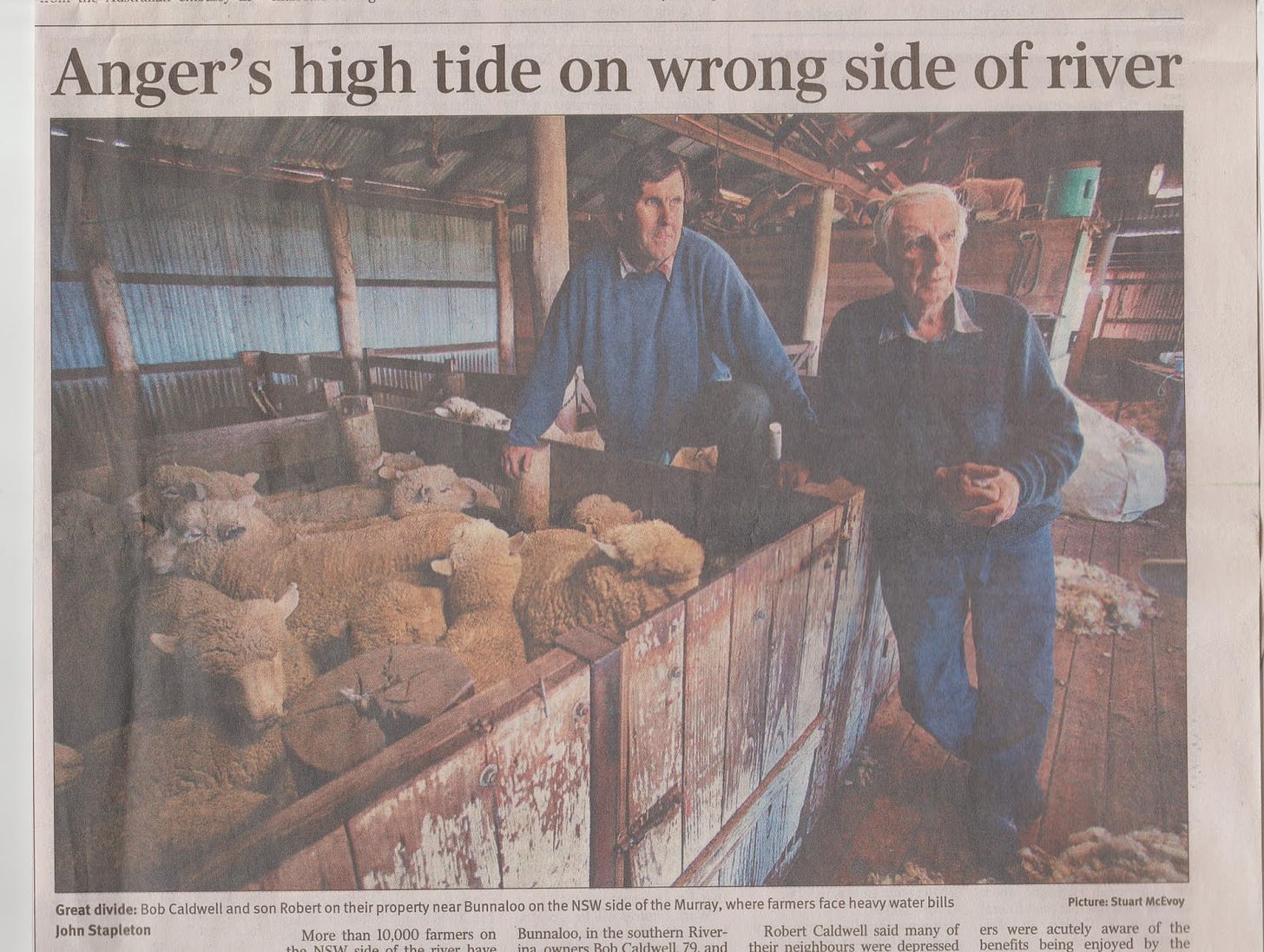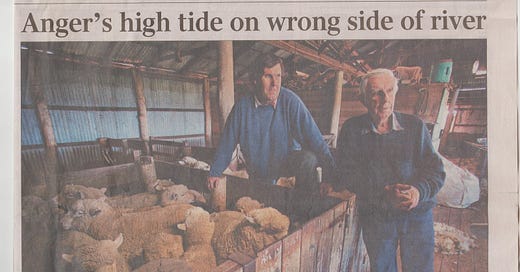River divides water winners, losers, The Australian, 25 June, 2007. Page One.


River divides water winners, losers: [3 All-round Metro Edition]
Stapleton, John. The Australian [Canberra, A.C.T] 25 June 2007: 1.
Abstract
"They resent it," he said. "Young blokes with families have big debtsand no cash. They should waive the fees."
"State Water, who bill us, are a government utility under enormous pressure from Treasury to make a profit," he said. "That money is being gouged out of farming families."
Head of the Murray Darling Basin Commission Wendy Craik, responsible for water allocations to NSW, Victoria and South Australia, said water storages were in a "terrible state" despite the rain, and the news from them was "not good".
Full Text
THEY can see each other across thetranquil reaches of the Murray River, where they have farmed for generations. They have endured the same droughts and prayed for the same rains.
But farmers on the Victorian and NSW sides of the Murray -- who will both get a zero allocation of irrigation water this year -- will be treated very differently by their state governments. More than 10,000 farmers on the NSW side of the river have just been hit with bills of $15,000 or more for irrigation licences, while their Victorian neighbours have been given $5000 each.
The inequity has prompted cries of pain from NSW farmers, many of whom have had no crop income this year or last, and who are not expecting cheques for the current crop until next year.
At Ballymeade, a 1400ha property near the NSW village of Bunnaloo, in the southern Riverina, owners Bob Caldwell, 79, and his son Robert Caldwell, 50, have just received a $20,000 bill.
Mixed farmers, the Caldwells rely on combining dry-land and irrigated crops, supplementing their income with fat lambs. "We need irrigation to keep our farming operation going," said Bob Caldwell.
"We can't survive without it. The Government is being pretty unfair."
Robert Caldwell said many neighbours felt they were being forced to pay for inefficient bureaucracy.
"They resent it," he said. "Young blokes with families have big debtsand no cash. They should waive the fees."
The man who has just sent out the "massive" water bills to 2000 farming families, general manager of Murray Irrigation George Warne, said NSW farmers were acutely aware of the benefits enjoyed by Victorians.
"State Water, who bill us, are a government utility under enormous pressure from Treasury to make a profit," he said. "That money is being gouged out of farming families."
When John Howard announced the national water plan last November, at a time of heightened
Continued -- Page 4
From Page 1
concern over the drought, he called on the states to "consider waiving or rebating the water charges".
Premier Steve Bracks heeded the call, just before the Victorian election. Labor holds a number of crucial rural seats, and farmers in the state express satisfaction.
North of the border, Premier Morris Iemma never had a chance of winning rural seats on the rich floodplains of the Murray, and is now disliked more than ever.
Federal Water Minister Malcolm Turnbull yesterday repeated calls for the charges to be dropped, but he has been ignored.
NSW Water Minister Phil Koperberg said it was a principle that farmers pay the cost of river water. "I sympathise with farmers and rural communities doing it tough ... decisions on water allocations are very difficult."
Victorian Water Minister John Thwaite said the $5000 rebates were meant to the ease the burden of drought.
In the late 1990s, Labor governments in both states ruled that farmers should cover the costs of running the rivers, including the maintenance of dams and the expenses of the irrigation companies and public servants administering water policy. The charges were never popular, and in recent years, they have started to bite harder.
Despite the best start to the wheat crop in a decade and excellent commodity prices, north of the Murray there is little optimism. Farmers feel costs such as water licensing fees are hampering their recovery.
Head of the Murray Darling Basin Commission Wendy Craik, responsible for water allocations to NSW, Victoria and South Australia, said water storages were in a "terrible state" despite the rain, and the news from them was "not good".



